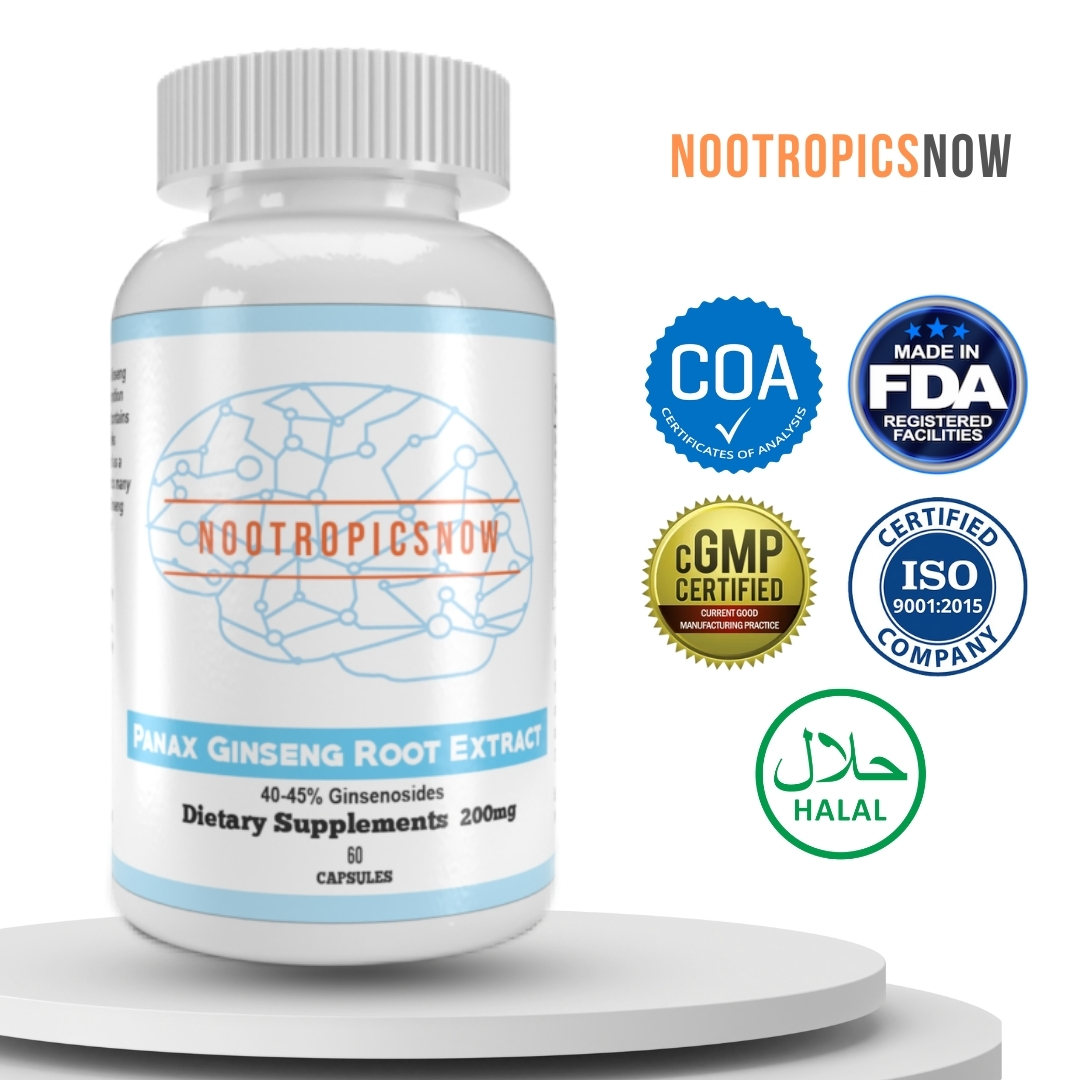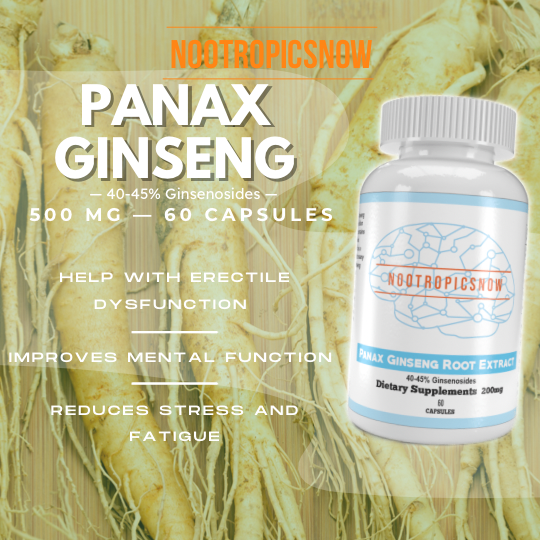Panax: Benefits, Uses & Side Effects

`markdown
Panax Ginseng: Unlocking Nature’s Potential for Well-being
Panax ginseng, often called Asian ginseng, is a potent medicinal herb with a rich history in traditional medicine. It’s renowned for its potential to enhance cognitive function, boost energy levels, and support overall well-being. This comprehensive guide delves into the depths of Panax ginseng, exploring its origins, benefits, uses, and safety considerations.
What is Panax Ginseng?
Panax ginseng is a perennial plant belonging to the Araliaceae family. Native to East Asia, particularly Korea, China, and eastern Siberia, it has been used for centuries in traditional Chinese medicine (TCM). The name “Panax” originates from the Greek word “panacea,” meaning “all-healing,” reflecting the herb’s reputation as a versatile remedy. The plant’s root, which takes several years to mature, is the part most commonly used for medicinal purposes. However, its cultivation requires specific environmental conditions, including cool climates and well-drained soil, which contribute to its relatively high cost.
Key Bioactive Compounds: Ginsenosides

The therapeutic properties of Panax ginseng are primarily attributed to a group of compounds known as ginsenosides. These saponins are unique to the Panax genus and are considered the main active components responsible for the herb’s wide range of effects. Researchers have identified over 40 different ginsenosides, each with potentially distinct biological activities. These ginsenosides interact with various physiological systems, influencing everything from the central nervous system to the immune system. Further investigations continue to elucidate the specific roles and mechanisms of action of individual ginsenosides.
Types of Panax Ginseng
While the term “ginseng” is often used generically, it’s essential to distinguish between different types of ginseng, as their chemical compositions and effects can vary significantly.
Potential Health Benefits of Panax Ginseng
Panax ginseng has been traditionally used to address a wide array of health concerns, and modern research is beginning to validate some of these historical applications.
Cognitive Enhancement
Studies suggest that Panax ginseng may improve cognitive function, including memory, focus, and mental processing speed. This benefit is particularly relevant for aging individuals or those experiencing cognitive decline. For example, a study published in the “Journal of Alzheimer’s Disease” found that Panax ginseng supplementation improved cognitive performance in patients with Alzheimer’s disease. This improvement is attributed to ginsenosides that may protect brain cells from damage and enhance neurotransmitter activity. It’s important to note that the effects are often more pronounced in individuals with pre-existing cognitive impairments.
Energy and Fatigue Reduction
Panax ginseng is well-known for its ability to combat fatigue and enhance energy levels. It can help individuals feel more alert and invigorated, making it a popular choice for those experiencing chronic fatigue or general tiredness. Researchers believe that ginsenosides modulate the stress response, reducing fatigue and improving overall vitality. Additionally, Panax ginseng may enhance physical endurance by improving oxygen utilization and reducing muscle damage during exercise.
Immune System Support
Research indicates that Panax ginseng can stimulate the immune system, enhancing its ability to fight off infections and diseases. It appears to increase the production of immune cells and enhance their activity. A meta-analysis of several studies found that Panax ginseng significantly reduced the frequency and duration of colds and flu. In particular, ginsenosides appear to stimulate the production of natural killer (NK) cells, which play a crucial role in destroying virus-infected cells.
Blood Sugar Regulation
Some studies suggest that Panax ginseng may help regulate blood sugar levels, making it potentially beneficial for individuals with diabetes or insulin resistance. It may improve insulin sensitivity and glucose uptake, contributing to better blood sugar control. However, it’s crucial to consult with a healthcare professional before using Panax ginseng for diabetes management, as it may interact with diabetes medications. The research regarding Panax Ginseng’s effect on blood sugar regulation is mixed, and further investigation is required.
Antioxidant and Anti-inflammatory Properties
Ginsenosides possess antioxidant and anti-inflammatory properties, which can help protect the body against cellular damage caused by free radicals. These properties may contribute to the prevention of chronic diseases, such as heart disease and cancer. Studies have shown that Panax ginseng can reduce oxidative stress and inflammation markers in various tissues, suggesting a broad protective effect. Therefore, Panax Ginseng may be used as a supplemental source of antioxidants for health maintenance.
Mood and Well-being
Panax ginseng may have a positive impact on mood and overall well-being. Some studies have shown that it can reduce symptoms of anxiety and depression, potentially due to its effects on neurotransmitter activity and the stress response. By modulating cortisol levels and promoting relaxation, Panax ginseng may help individuals cope with stress and improve their overall quality of life. However, the effects are often subtle and may vary depending on individual factors.
How to Use Panax Ginseng
Panax ginseng is available in various forms, including:
The optimal dosage of Panax ginseng varies depending on the form, concentration, and individual needs. It’s generally recommended to start with a low dose and gradually increase it as needed. Following the manufacturer’s instructions or consulting with a healthcare professional is crucial.
Dosage Recommendations
It’s often recommended to cycle Panax ginseng, taking it for several weeks or months followed by a break. This can help prevent the development of tolerance and maintain its effectiveness.
Potential Side Effects and Precautions
While Panax ginseng is generally considered safe for most people, it can cause side effects in some individuals. Common side effects include:
Precautions:
Drug Interactions
Panax ginseng can interact with several medications, potentially altering their effects. It’s essential to be aware of these interactions and consult with a healthcare professional before using Panax ginseng if you are taking any of the following medications:
Choosing a High-Quality Panax Ginseng Supplement
With numerous Panax ginseng products available on the market, selecting a high-quality supplement is crucial. Here are some factors to consider:
The Future of Panax Ginseng Research
Ongoing research continues to explore the potential benefits of Panax ginseng for a wide range of health conditions. Future studies may focus on:
Conclusion: A Natural Ally for Well-being
Panax ginseng is a time-honored herb with a wealth of potential health benefits. From enhancing cognitive function and boosting energy levels to supporting the immune system and promoting overall well-being, Panax ginseng offers a natural approach to improving health. While it’s generally safe for most people, it’s important to be aware of potential side effects and interactions. By choosing a high-quality supplement, following dosage recommendations, and consulting with a healthcare professional, you can harness the power of Panax ginseng and unlock its potential for a healthier, more vibrant life. While Panax Ginseng has a long history of traditional usage, more studies need to be conducted to fully reveal its potential.

View Product
`
`markdown
Panax Ginseng: Unveiling the Power of the Root
Panax Ginseng, often dubbed the “king of herbs,” boasts a rich history intertwined with traditional medicine and modern research. This section delves into the comprehensive world of Panax Ginseng, exploring its varieties, benefits, side effects, and how it stacks up against other cognitive enhancers.
Varieties of Panax Ginseng: A Comparative Look
The Panax genus encompasses several species, each with distinct characteristics and purported benefits. Understanding these differences is crucial for selecting the right type for your needs. While all share ginsenosides as active components, their concentration and profiles vary, influencing their effects.
| Species | Common Name | Origin | Key Characteristics | Primary Uses |
|---|---|---|---|---|
| — | — | — | — | — |
| Panax ginseng | Asian Ginseng, Korean Ginseng, Chinese Ginseng | East Asia (China, Korea, Russia) | Considered the most potent and well-researched variety. Often cultivated for 6 years or more. Contains unique ginsenosides like Rg1 and Rb1 in varying ratios. | Cognitive enhancement, immune support, energy boost, adaptogen. |
| Panax quinquefolius | American Ginseng | North America | Contains different ginsenosides compared to Asian ginseng, with a higher concentration of Rb1. Often considered more calming and less stimulating than Asian ginseng. | Stress reduction, immune support, blood sugar regulation. |
| Panax notoginseng | Notoginseng, Sanchi Ginseng | Southern China | Primarily used for its hemostatic (blood-stopping) properties. Contains unique ginsenosides like R1. | Wound healing, blood circulation, pain relief. |
| Panax vietnamensis | Vietnamese Ginseng | Vietnam | Relatively rare and less studied than other varieties. Contains unique ginsenosides with potential antioxidant and anti-inflammatory properties. | Traditional medicine, limited modern research. |
It is important to note that the terms “red ginseng” and “white ginseng” refer to the processing of Panax ginseng, not distinct species. White ginseng is dried without heat, while red ginseng is steamed and then dried, a process that may alter the ginsenoside profile and increase certain compounds.
Unlocking the Benefits: Cognitive and Physical Enhancement
Panax ginseng has garnered attention for its potential to enhance both cognitive and physical performance. While research continues, evidence suggests a range of potential benefits. Notably, various clinical trials have been conducted to ascertain the herb’s efficacy.
Cognitive Function
Physical Performance
It’s worth highlighting that the extent and consistency of these benefits can vary depending on factors such as dosage, duration of use, individual response, and the specific type of Panax ginseng used.

View Product

View Product
Common Side Effects
Less Common but Serious Side Effects
Precautions and Contraindications
Drug Interactions
Panax ginseng can interact with several medications, including:
It’s imperative to consult with a healthcare professional before using Panax ginseng, especially if you have any underlying health conditions, are taking medications, or are pregnant or breastfeeding.
Dosage and Administration: Finding the Right Balance
The optimal dosage of Panax ginseng can vary depending on the individual, the specific product, and the intended use. It’s generally recommended to start with a low dose and gradually increase it as needed, while closely monitoring for any side effects.
Forms of Panax Ginseng
Dosage Guidelines
Administration Tips
Panax Ginseng vs. Other Cognitive Enhancers: A Comparative Analysis
Panax ginseng is just one of many natural and synthetic substances that are used to enhance cognitive function. Comparing it to other popular cognitive enhancers can help you make an informed decision about which option is best for you.
| Cognitive Enhancer | Mechanism of Action | Primary Benefits | Side Effects |
|---|---|---|---|
| — | — | — | — |
| Panax Ginseng | Modulates neurotransmitter activity, reduces oxidative stress, enhances cerebral blood flow. | Improved memory, focus, mood, and energy levels. | Insomnia, digestive issues, headaches, nervousness. |
| Caffeine | Blocks adenosine receptors, increasing alertness and reducing fatigue. | Increased alertness, focus, and energy levels. | Anxiety, insomnia, jitteriness, heart palpitations. |
| L-Theanine | Promotes relaxation without drowsiness, enhances alpha brain waves. | Reduced anxiety, improved focus, and cognitive performance. | Generally well-tolerated, but can cause mild headache or drowsiness in some people. |
| Bacopa Monnieri | Enhances nerve signal transmission, reduces anxiety. | Improved memory, learning, and cognitive function. | Digestive upset, dry mouth, fatigue. |
| Lion’s Mane Mushroom | Stimulates nerve growth factor (NGF) production. | Improved memory, focus, and nerve health. | Generally well-tolerated, but can cause mild digestive upset in some people. |
|---|
| Ginkgo Biloba | Improves blood flow to the brain, reduces oxidative stress. | Improved memory, cognitive function, and blood circulation. | Headaches, dizziness, digestive upset, increased risk of bleeding. |
|---|
| Modafinil | Increases dopamine and norepinephrine levels in the brain. | Increased alertness, focus, and cognitive performance. | Headaches, nausea, anxiety, insomnia. |
|---|
Key Considerations
Ultimately, the best cognitive enhancer for you will depend on your individual needs, preferences, and health status. It’s important to do your research, consult with a healthcare professional, and start with a low dose to assess your tolerance.
`





